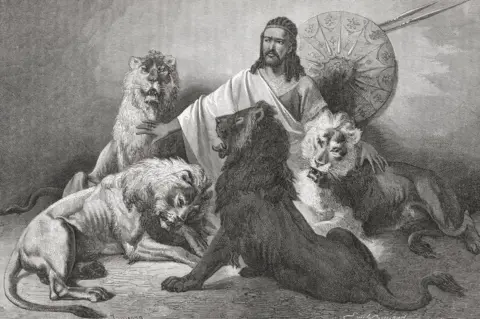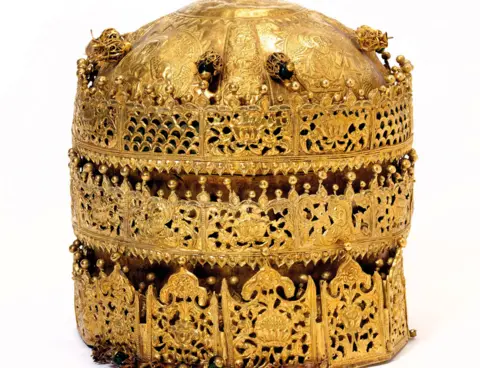Ethiopian Emperor Tewodros II's stolen hair to be returned by UK
 Universal History Archive/Getty Images
Universal History Archive/Getty ImagesA British museum is to return a lock of hair that the Ethiopian government considers a national treasure.
It was cut from the head of Emperor Tewodros II, who killed himself rather than be taken prisoner by the British during their 1868 invasion of Ethiopia.
His seven-year-old son Prince Alemayehu was taken to the UK along with looted treasures. He became a favourite of Queen Victoria before dying aged 18.
His remains are kept in Windsor Castle despite campaigns for their return.
Strands of Emperor Tewodros II's hair were given to the National Army Museum in London 60 years ago.
The museum told the BBC it had decided not to make photographs of the hair public out of respect, because the matter was "too sensitive". The remains are described as two pieces "no bigger than the size of a two-pence coin".
The National Army Museum has now agreed to return the artefact, but says it is not returning any other items of African origin.
"It's definitely not a precedent," a spokesperson for the museum told the BBC.
"That's the only one that's been requested. They have to be formal, written requests to the director with a case".
The BBC's Emmanuel Igunza in Addis Ababa says talks about the process of repatriation with the Ethiopian government are set to begin within the next few days.
The move has reignited demands for the UK to return all the looted artefacts on display in British museums.
 V&A Museum
V&A MuseumHistorians say 15 elephants and 200 mules were needed to cart away all the loot from Maqdala, the emperor's northern citadel capital.
Ethiopia lodged a formal request in 2008 at various British institutions for the return of the treasures worth millions of dollars taken from the site.
The announcement comes at the end of a year-long commemorations marking 150 years since the Battle of Maqdala.
The so-called Napier expedition, often described as the largest military offensive by the British empire in Africa, saw thousands of soldiers deployed to face Emperor Tewodros II.

The battle of Maqdala
 V&A Museum
V&A Museum- In the mid-19th Century Emperor Tewodros II decided to modernise his empire, Abyssinia, by opening up relations with the UK
- But things deteriorated after requests for military assistance were ignored
- In protest the emperor detained the British consul and other foreigners
- Britain reacted by sending an army to the emperor's fortress in Maqdala in 1868
- Rather than become a prisoner, Emperor Tewodros II took his own life
- British forces left with manuscripts, crowns, crosses, chalices, religious icons, royal and ecclesiastic vestments, shields and arms
- The emperor's seven-year-old son was also taken to Britain and then educated at Rugby School:
 V&A Museum
V&A Museum- He died of pleurisy at 18 and is buried at Windsor Castle
Several African countries have requested the return of artefacts taken by European powers.
Some years after Benin first made its official request, France has agreed to return 26 thrones and statues taken in the colonial era.
A recent report commissioned by French President Emmanuel Macron recommended that African treasures in French museums be returned to their countries of origin. It states most of the Africa collection in the Quai Branly museum in Paris - approximately 46,000 pieces - was acquired with some degree of duress.
"We've read it and we consider it's a positive report - it's legitimate and follows the course of history", Senegal's Culture Minister Abdou Latif Coulibaly told the BBC in November.
Senegal said it had asked France to return more than 100 artefacts.
